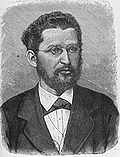- Revisionism (Marxism)
-
 Eduard Bernstein, originator of the original Revisionism.
Eduard Bernstein, originator of the original Revisionism.
Social democracy
 DevelopmentHumanism
DevelopmentHumanism
Age of Enlightenment
French Revolution
Utopian socialism
Trade unionism
Revolutions of 1848
Orthodox Marxism
Revisionism
Reformism
Gradualism
Frankfurt DeclarationIdeasRepresentative democracy
Civil liberties
Economic democracy
Labor rights
Mixed economy
Nationalization
Welfare state
Fair trade
Environmental protection
Rhine Capitalism
Secularism
Social corporatism
Social Market Economy
FolkhemmetPeopleSocial Democrats · Clement Attlee · Eduard Bernstein · Léon Blum · Hjalmar Branting · Ignacy Daszyński · Tommy Douglas · Friedrich Ebert · David Lewis · Michael Joseph Savage · Bülent Ecevit · Jean Jaurès · Karl Kautsky · Ferdinand Lassalle · Jack Layton · Georgi Plekhanov · John Curtin · Gustav Möller · Per Albin Hansson · Willy Brandt ·OrganizationsWithin the Marxist movement, the word revisionism is used to refer to various ideas, principles and theories that are based on a significant revision of fundamental Marxist premises.[1] The term is most often used by those Marxists who believe that such revisions are unwarranted and represent a "watering down" or abandonment of Marxism. As such, revisionism often carries pejorative connotations. Few Marxists label themselves as revisionists. The opposing term and concept, even used among Marxists, is Marxist dogmatism.
The term "revisionism" has been used in a number of different contexts to refer to a number of different revisions (or claimed revisions) of Marxist theory:
- In the late 19th century, revisionism was used to describe democratic socialist writers such as Eduard Bernstein and Jean Jaurès, who sought to revise Karl Marx's ideas about the transition to socialism and claimed that a revolution through force was not necessary to achieve a socialist society. The views of Bernstein and Jaurès gave rise to reformist theory, which asserts that socialism can be achieved through gradual peaceful reforms from within a capitalist system.[2]
- In the 1920s and 1930s, the International Left Opposition led by Leon Trotsky, which had been expelled from the Communist International, accused the "revisionist" leadership of the Comintern and Soviet Union of revising the internationalist principles of Marxism and Leninism in favor of the aspirations of an elite bureaucratic caste which had come to power in the Soviet Union.[3] The Trotskyists saw the nascent "Stalinist" bureaucracy as a roadblock on the proletariat's path to world socialist revolution, and to the shifting policies of the Comintern, they counterposed the Marxist theory of Permanent Revolution. The Soviet authorities, meanwhile, labeled the Trotskyists as "revisionists" and eventually expelled them from the Communist Party of the Soviet Union, whereupon the Trotskyists founded their Fourth International.
- In the 1940s and 1950s within the international communist movement, revisionism was a term used by Stalinists to describe communists who focused on consumer goods production instead of heavy industry; accepted national differences instead of promoting proletarian internationalism; and encouraged democratic (non-communist) reforms instead of remaining faithful to the idea of communist revolution. Revisionism was also one of the charges leveled at Titoists as punishment for their pursuance of a relatively independent form of communist ideology, amidst a series of post-World War 2 purges beginning in 1949 in Eastern Europe by the Soviet administration under Stalin. After Stalin's death a more participatory, more democratic form of socialism became briefly acceptable in Hungary during Imre Nagy's government (1953-1955) and in Poland during Władysław Gomułka's government, containing ideas that the rest of the Soviet bloc, and the Soviet Union itself, variously considered revisionist, although neither Nagy nor Gomułka described themselves as revisionists, since to do so would have been self-deprecating.
- Following the Soviet repression of the Hungarian Revolution in 1956, and also the Secret Speech of that same year denouncing Stalin, many communist activists, astounded and disheartened by what they saw as the betrayal of Marxist-Leninist principles by the very people who had founded them, resigned from western communist parties in protest. These quitters were sometimes accused of revisionism by those communists who remained in these parties, although some of these same loyalists also shortly thereafter split from the same communist parties in the 1960s to become the New Left "anti-revisionists", indicating that they, too, were disillusioned by the actions of the Soviet Union by that point in time. Most of those who left in the sixties started aligning themselves closely with Mao Zedong as opposed to the Soviet Union. E. P. Thompson's New Reasoner was an example.
- In the early 1960s, Mao Zedong and the Communist Party of China revived the term revisionism to attack Nikita Khrushchev and the Soviet Union over various ideological and political issues, as part of the Sino-Soviet split. The Chinese routinely described the Soviets as "modern revisionists" through the 1960s. This usage was copied by the various Maoist groups that split off from communist parties around the world. In 1978, the Sino-Albanian Split occurred, which caused Enver Hoxha, the General Secretary of Albania, to also condemn Maoism as revisionist. This caused a split in the Maoist movement, with some following the Albanian Party of Labour's line, most notably the Communist Party of New Zealand and the Communist Party of Canada (Marxist-Leninist).
See also
References
- ^ Oxford English Dictionary Revisionism 1. "A policy first put forward in the 1890s by Edward Bernstein (1850-1932) advocating the introduction of socialism through evolution rather than revolution, in opposition to the orthodox view of Marxists; hence a term of abuse used within the communist world for an interpretation of Marxism which is felt to threaten the canonical policy." with the first use in English "1903 Social-Democrat VII. 84 (heading) Revisionism in Germany."
- ^ Philip P. Wiener (ed). Dictionary of the History of Ideas, Charles Scribner's Sons, New York, in 1973-74. R. K. Kindersley Marxist revisionism: From Bernstein to modern forms, website of the University of Virginia Library. Accessed 28 April 2008
- ^ Leon Trotsky. The Third International After Lenin, The Militant, 1929. Accessed 14 March 2010
Wikimedia Foundation. 2010.
